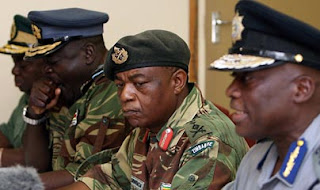MR MUGABE, WE URGE YOU AND YOUR KILLING MACHINE TO RESPECT THE RULE OF LAW
Mr Mugabe, you might not know what Rule of Law is all about, in that case, please allow me to help you in this regard, at least you cannot say you did not know. Rule of law serves as a check on abuses of private and government power, providing equal access to all citizens and a clearly defined procedure for formal justice. Well-written laws are a first step, but they must also be fairly and openly enforced by accessible and accountable institutions. Only when basic standards of fair treatment, independent and ethical law enforcement, and due process for all are met, is there rule of law.
Core Building Blocks of Rule of Law
1. Fair laws: The laws need to be clear, publicized, stable, and fair, and they must protect internationally recognized rights.
2. Accountable officials: The government and its officials and agents must be accountable under the law.
3. Due process: The process by which the laws are enacted, administered, and enforced needs to be universally accessible, fair, and efficient.
4. An independent judicial system: Laws need to be upheld, and access to justice provided, by competent, independent, and ethical judges, law enforcement officials, and attorneys or representatives, with adequate resources to perform their roles.
All truly democratic nations aspire to respect the rule of law. Even in countries where freedom of association, freedom of speech, and other human rights are routinely ignored, there is growing hope. Increasingly, across the world, justice under the law is possible. But this justice must be built. Institutions must be created or reformed to guarantee progress toward fairness and equality and to protect human freedoms and fundamental rights.
Rule of Law and Worker Rights
Worker rights are essential to democratic societies. Across the globe, people spend most of their waking hours at work. Along with providing justice in the workplace, worker rights empower people to exercise fundamental rights in their broader communities. Legal protections for workers on the job provide them with the ability to enjoy freedom of speech, assembly, and movement as well as other human and political rights.
Unions Build and Protect the Rule of Law
Human rights must be demanded, created, maintained, and preserved. As the main proponents of worker rights and social protections worldwide, unions play an important role in building and defending rule of law. Whether fighting against slavery or for the right to a pension, labor unions must act as a balance against private, corporate, and governmental abuse of workers. Even workers who are not members of unions benefit from a vibrant, democratic labor movement. Unions have the capacity to advocate for protections against child labor and human trafficking, enforcement of occupational health and safety codes, wage and hour laws, and many other vital rights. Only unions can democratically and sustainably mobilize workers to defend their economic interests against exploitation in an increasingly competitive global economy.
Stanley Mauro Jensen
Core Building Blocks of Rule of Law
1. Fair laws: The laws need to be clear, publicized, stable, and fair, and they must protect internationally recognized rights.
2. Accountable officials: The government and its officials and agents must be accountable under the law.
3. Due process: The process by which the laws are enacted, administered, and enforced needs to be universally accessible, fair, and efficient.
4. An independent judicial system: Laws need to be upheld, and access to justice provided, by competent, independent, and ethical judges, law enforcement officials, and attorneys or representatives, with adequate resources to perform their roles.
All truly democratic nations aspire to respect the rule of law. Even in countries where freedom of association, freedom of speech, and other human rights are routinely ignored, there is growing hope. Increasingly, across the world, justice under the law is possible. But this justice must be built. Institutions must be created or reformed to guarantee progress toward fairness and equality and to protect human freedoms and fundamental rights.
Rule of Law and Worker Rights
Worker rights are essential to democratic societies. Across the globe, people spend most of their waking hours at work. Along with providing justice in the workplace, worker rights empower people to exercise fundamental rights in their broader communities. Legal protections for workers on the job provide them with the ability to enjoy freedom of speech, assembly, and movement as well as other human and political rights.
Unions Build and Protect the Rule of Law
Human rights must be demanded, created, maintained, and preserved. As the main proponents of worker rights and social protections worldwide, unions play an important role in building and defending rule of law. Whether fighting against slavery or for the right to a pension, labor unions must act as a balance against private, corporate, and governmental abuse of workers. Even workers who are not members of unions benefit from a vibrant, democratic labor movement. Unions have the capacity to advocate for protections against child labor and human trafficking, enforcement of occupational health and safety codes, wage and hour laws, and many other vital rights. Only unions can democratically and sustainably mobilize workers to defend their economic interests against exploitation in an increasingly competitive global economy.
Stanley Mauro Jensen


Comments